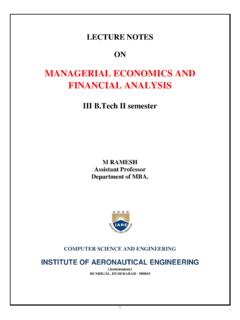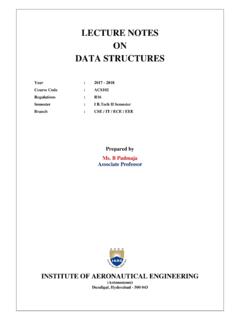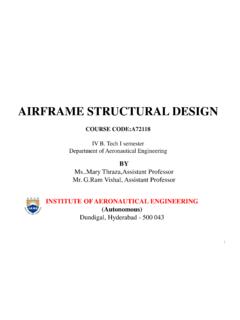Transcription of OUTCOME BASED EDUCATION WITH CHOICE BASED CREDIT …
1 INSTITUTE OF AERONAUTICAL ENGINEERING (Autonomous) (Approved by AICTE | NAAC Accreditation with A Grade | Accredited by NBA | Affiliated to JNTUH) Dundigal, Hyderabad - 500 043, Telangana OUTCOME BASED EDUCATION WITH CHOICE BASED CREDIT SYSTEM B. TECH PROGRAMS (FOUR YEARS) Aeronautical Engineering | Computer Science and Engineering | Computer Science and Engineering (AI & ML) | Computer Science and Engineering (Data Science) | Computer Science and Engineering (Cyber Security) | Computer Science and Information Technology | Information Technology | Electronics and Communication Engineering | Electrical and Electronics Engineering | Mechanical Engineering | Civil Engineering ACADEMIC REGULATIONS, COURSE STRUCTURE AND SYLLABI Regular Four Year Degree Program (for the batches admitted from the academic year 2020 - 2021) & (Lateral Entry Scheme) (for the batches admitted from the academic year 2021 - 2022)
2 These rules and regulations may be altered/changed from time to time by the academic council FAILURE TO READ AND UNDERSTAND THE RULES IS NOT AN EXCUSE ii | P a g e VISION To bring forth professionally competent and socially sensitive engineers, capable of working across cultures meeting the global standards ethically. MISSION To provide students with an extensive and exceptional EDUCATION that prepares them to excel in their profession, guided by dynamic intellectual community and be able to face the technically complex world with creative leadership qualities. Further, be instrumental in emanating new knowledge through innovative research that emboldens entrepreneurship and economic development for the benefit of wide spread community.
3 QUALITY POLICY Our policy is to nurture and build diligent and dedicated community of engineers providing a professional and unprejudiced environment, thus justifying the purpose of teaching and satisfying the stake holders. A team of well qualified and experienced professionals ensure quality EDUCATION with its practical application in all areas of the Institute. iii | P a g e PROGRAM OUTCOMES (PO's) Engineering Graduates will be able to: PO1: Engineering Knowledge: Apply the knowledge of mathematics, science, engineering fundamentals, and an engineering specialization to the solution of complex engineering problems. PO2: Problem Analysis: Identify, formulate, review research literature, and analyze complex engineering problems reaching substantiated conclusions using first principles of mathematics, natural sciences, and engineering sciences.
4 PO3: Design/Development of Solutions: Design solutions for complex engineering problems and design system components or processes that meet the specified needs with appropriate consideration for the public health and safety, and the cultural, societal, and environmental considerations. PO4: Conduct Investigations of Complex Problems: Use research- BASED knowledge and research methods including design of experiments, analysis and interpretation of data, and synthesis of the information to provide valid conclusions. PO5: Modern Tool Usage: Create, select, and apply appropriate techniques, resources, and modern engineering and IT tools including prediction and modeling to complex engineering activities with an understanding of the limitations. PO6: The Engineer and Society: Apply reasoning informed by the contextual knowledge to assess societal, health, safety, legal and cultural issues and the consequent responsibilities relevant to the professional engineering practice.
5 PO7: Environment and Sustainability: Understand the impact of the professional engineering solutions in societal and environmental contexts, and demonstrate the knowledge of, and need for sustainable development. PO8: Ethics: Apply ethical principles and commit to professional ethics and responsibilities and norms of the engineering practice. PO9: Individual and Team Work: Function effectively as an individual, and as a member or leader in diverse teams, and in multidisciplinary settings. PO10: Communication: Communicate effectively on complex engineering activities with the engineering community and with society at large, such as, being able to comprehend and write effective reports and design documentation, make effective presentations, and give and receive clear instructions. PO11: project Management and Finance: Demonstrate knowledge and understanding of the engineering and management principles and apply these to one s own work, as a member and leader in a team, to manage projects and in multidisciplinary environments.
6 PO12: Life-Long Learning: Recognize the need for, and have the preparation and ability to engage in independent and life-long learning in the broadest context of technological change. iv | P a g e CONTENTS Section Particulars Page 1 CHOICE BASED CREDIT System 1 2 Medium of Instruction 1 3 Programs Offered 1 4 Semester Structure 2 5 Registration / Dropping / Withdrawal 4 6 CREDIT System 4 7 Curricular Components 5 8 Evaluation Methodology 6 9 Make-up Examination 10 10 Supplementary Examinations 10 11 Attendance Requirements and Detention Policy 10 12 Conduct of Semester End Examinations and Evaluation 11 13 Scheme for the Award of Grade 11 14 Letter Grades and Grade Points 12 15 Computation of SGPA and CGPA 13 16 Illustration of Computation of SGPA and CGPA 14 17 Review of SEE Theory and Answer Books 14 18 Promotion Policies 14 19 Graduation Requirements 15 20 Betterment of Marks in the Courses Already Passed 15 21 Award of Degree 16 22 with Honours
7 Or additional Minor in Engineering 17 23 Temporary Break of Study from the Program 19 24 Termination from the Program 20 25 Transcript 20 26 With-holding of Results 20 27 Graduation Day 20 28 Discipline 20 29 grievance redressal Committee 20 30 Transitory Regulations 21 31 Revision of Regulations and Curriculum 23 32 Frequently asked Questions and Answers about autonomy 24 33 Malpractice Rules 28 34 Course Catalog Computer Science and Engineering 31 35 Syllabus 37 36 Undertaking by Student / Parent 115 Take up one idea. Make that one idea your life-think of it, dream of it, live on that idea. Let the brain muscles, nerves, every part of your body be full of that idea and just leave every other idea alone. This is the way to success Swami Vivekananda v | P a g e PRELIMINARY DEFINITIONS AND NOMENCLATURES AICTE: Means All India Council for Technical EDUCATION , New Delhi.
8 Autonomous Institute: Means an institute designated as Autonomous by University Grants Commission (UGC), New Delhi in concurrence with affiliating University (Jawaharlal Nehru Technological University, Hyderabad) and State Government. Academic Autonomy: Means freedom to an institute in all aspects of conducting its academic programs, granted by UGC for Promoting Excellence. Academic Council: The Academic Council is the highest academic body of the institute and is responsible for the maintenance of standards of instruction, EDUCATION and examination within the institute. Academic Council is an authority as per UGC regulations and it has the right to take decisions on all academic matters including academic research. Academic Year: It is the period necessary to complete an actual course of study within a year.
9 It comprises two main semesters , (one odd + one even) and one supplementary semester. Branch: Means specialization in a program like degree program in Aeronautical Engineering, degree program in Computer Science and Engineering etc. Board of Studies (BOS): BOS is an authority as defined in UGC regulations, constituted by Head of the Organization for each of the departments separately. They are responsible for curriculum design and updation in respect of all the programs offered by a department. Backlog Course: A course is considered to be a backlog course, if the student has obtained a failure grade (F) in that course. Basic Sciences: The courses offered in the areas of Mathematics, Physics, Chemistry etc., are considered to be foundational in nature. Betterment: Betterment is a way that contributes towards improvement of the students grade in any course(s).
10 It can be done by either (a) re-appearing or (b) re-registering for the course. Commission: Means University Grants Commission (UGC), New Delhi. CHOICE BASED CREDIT System: The CREDIT BASED semester system is one which provides flexibility in designing curriculum and assigning credits BASED on the course content and hours of teaching along with provision of CHOICE for the student in the course selection. Certificate Course: It is a course that makes a student to have hands-on expertise and skills required for holistic development in a specific area/field. Compulsory course: Course required to be undertaken for the award of the degree as per the program. Continuous Internal Examination: It is an examination conducted towards sessional assessment. Core: The courses that are essential constituents of each engineering discipline are categorized as professional core courses for that discipline.









